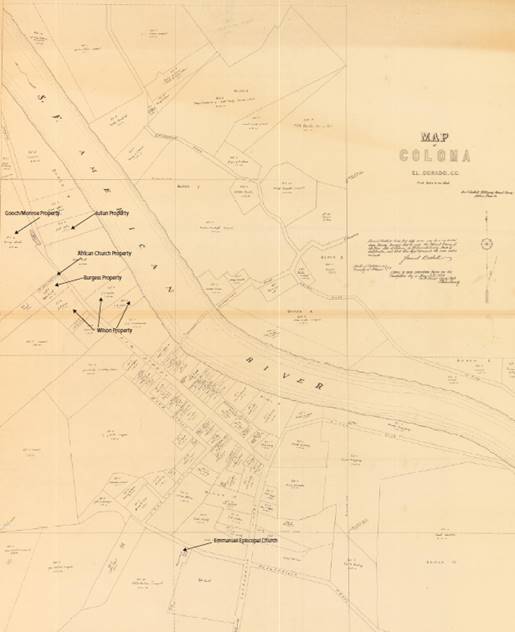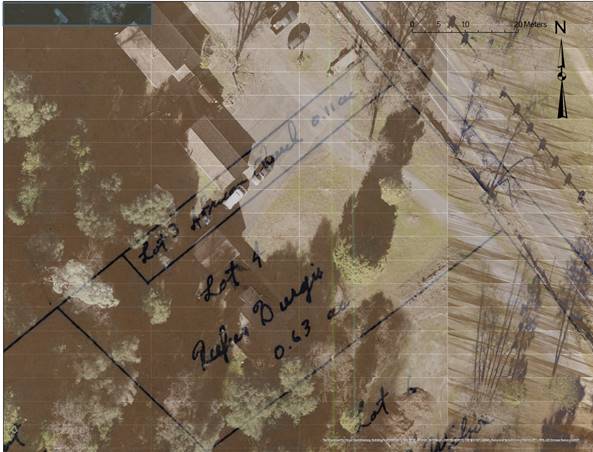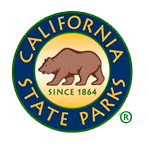Historic Properties Once Owned by African American Families in Coloma
Below is information compiled from historical research and gathered by State Parks regarding historic properties once owned by African American families in Coloma that have since been acquired and incorporated into Marshall Gold Discovery State Historic Park. California State Parks has been working with the Burgess Family and other descendants of the gold rush settler families to actively listen to their stories, share information between parties, and expand interpretation of their families’ history in the park programs and exhibits.
Through historic research, State Parks has confirmed that portions of land within Marshall Gold Discovery State Historic Park in Coloma were owned by the Burgess family. Rufus Burgess owned approximately 9 acres of property prior to his death. After his death, Josephine Burgess sold the lot that Rufus's blacksmith shop occupied to the Gallagher family, reducing her property holdings. Much of the land was purchased by the state of California through eminent domain and real estate transactions between the state of California and the Burgess family. As it relates to the Emmanuel Church, research conducted to date has not found documentation that the property where the Emmanuel Church resides was previously owned by the Burgess Family. The records do show the Burgess family owned property next to a different church known as the African Methodist Episcopal (AME) Church that is no longer standing.
As we learn more, we will continue to assess and update the interpretation of Marshall Gold State Historic Park. California State Parks recognizes there are contributions of diverse people and cultures throughout California’s history that have been overlooked. We are committed to telling a thorough, inclusive, and complete history of our state.
Information on the Burgess Family and other African American families’ historic properties (i.e., Gooch /Monroe, Julian and Wilson) and church properties in historic Coloma (Figure 1):
- An “African Church” is identified on a parcel of land located between the Burgess (Block 7, Lot 4) and Monroe/Gooch (Block 7, Lot 2) properties. The parcel is identified as “African Church 0.11 ac” and numbered as Block 7, Lot 3 (Figure 2). As noted above, this "African Church" is believed to be the AME Church that is no longer standing today.
- Analysis of high-definition aerial imagery and LiDAR (Light Detection and Ranging) remote sensing survey data, conducted in January 2021 in the SHP, overlaid with the 1873 Coloma map indicate that the African Church property is within an area currently containing park maintenance shops and housing, constructed post World War II (see Figure 2).
Figure 1 Burgess and other African American families’ historic properties labeled in the attached map graphic along with labels indicating locations of the African Church property and the Emmanuel Church, 1873 Coloma Map.

Figure 2 Detail view of the African Church property, 1873 Coloma map.
Table 1 Historical Chronologies for the Coloma African Methodist Episcopal (AME) Church and Emmanuel Church in Coloma (adapted from information compiled by volunteer historian and researcher, Jeff Lee)
|
Date |
Description |
Source(s) |
|
|
||
|
1856 |
AME Church is established in Placerville and Coloma |
Pacific Appeal, 6 June 1863 (verified by Marilyn Demas 6/29/2006) |
|
1861 |
Rev. Peter Killingworth made rounds to eight locations in El Dorado County including Coloma for the AME Church. Jacob Mitchell from Stockton also made visits. |
Eunsum Celeste, All Roads Lead to San Francisco, Black California Networks. 2009. |
|
1862, Jul 10 |
African American residents of Coloma meet in the Methodist Episcopal Church (does not specific if at the African ME church). Church to plan Celebration. |
Pacific Appeal, July 22, 1862 |
|
1863, Jun 27 |
Grant Deed of property to build a church and residence from Jacob Johnson to African M. E. CH. Trustees. Jacob Johnson, a black man from Missouri who was living with Ann & peter Gavish and Patrick Holland in the vicinity of Nelson Bell. Most likely the same lot donated. 1870 census show him having moved and living in Cold Springs. |
Verified by recorded El Dorado County deed. Later identified at Block 7, Lot 3. Also mentioned is this location by Marilyn Demas in her 10/23/2006 email to Tonia Burgess. |
|
1863 |
AME congregation has a comfortable house of worship in Coloma free of debt. |
Colored Citizens Meeting September 4-10,1863 |
|
1864 |
Church members 6, with attendees up to 100. Sunday School members 7, with other attending. |
Marilyn Demas 6/29/2006 |
|
1865 |
El Dorado County has one Black Church and two lots. |
Colored Citizens Meeting 1865 |
|
1872, Mar |
George Ingham repossessed the African Church and placed it Lot 3, Block 7 |
Burgess Family Deeds |
|
1873 |
1873 Coloma map shows African Church label on Lot 3, Block 7, 0.11 acres (next to Rufus Burgess property) |
|
|
1879, Jun 27 |
Grant Deed from El Dorado County Tax Collector to Rufus Burgess |
El Dorado County Deed to Rufus Burgess |
|
1949, Sep 21 |
Final Condemnation and sale of property to State of California |
El Dorado County Recorder |
|
|
||
|
1854 |
“We hope to have erected in a short time a Methodist and Episcopal church.” |
Empire Argus December 16, 1854 |
|
1855, Jan |
A plan was taken to erect a Church, subscriptions commenced, a plan had been adopted and the building commenced. |
Early Days of My Episcopate, Rev. Kip |
|
1856, May |
“...the first object which greeting my sight as we entered town, was the little Church that had been built since my last visit.” (He would travel from Sacramento to the Placerville Church before coming to Coloma) |
Early Days of My Episcopate, Rev. Kip |
|
1856, Set 15 |
Emanuel Church (Episcopalian) Founded Under authority of Reverend Kip, organized by the Reverend C.C. Peirce, pastor Emanuel Church, located south side of Church Street. |
1862 Directory of the City of Placerville, Coloma section. Also sourced from the biography of C.C. Peirce. |
|
1857, Feb 22 |
Rev. McDonald of the Episcopal Church of Coloma will perform divine service in the Methodist Church of this City, tomorrow evening, at 7. |
Mt. Democrat, 2/21/1847 |
|
1857, Mar 14 |
The lot is donated by the Wimmers to Emanual Church Coloma |
El Dorado County Recorder/Clerk |
|
1862 |
Three quite good churches buildings, occupied by M.E. Church, the Episcopalians Church and the Catholic Church. Emanuel Church (Episcopalian) organized Sept. 15, 1856, Rev. C.C. Peirce Pastor |
Placerville City Guide, Coloma section, pp. 11. Page 12, Episcopal Church, south side of Church Street. |
|
1873 |
The church is seen in Lot 14, Block 7 |
1873 Coloma map |
|
1873 |
Chalmers purchases lot from the county |
El Dorado County Recorder |
|
1874 |
Chalmers sells property to Ezra Smith |
El Dorado County Recorder |
|
1879 |
Ezra Smith sells property to Osborne and Blundell |
El Dorado County Recorder |
|
1885 |
James Marshall funeral service held here |
|
|
1891 |
Osborne and Blundell purchase Plants lot |
El Dorado County Recorder |
|
1901, May 13 |
Albert Norris purchased property to Metcalf, excluding Episcopal church property |
El Dorado County Recorder |
|
1920, Mar 29 |
Mrs. Norris sells property to Metcalf, excluding Episcopal church property |
Deed El Dorado County |
|
1921, Apr 14 |
Church property deeded by Mrs. Norris to Metcalf and then from Metcalf to the Methodist Church |
El Dorado County Recorder |
|
1946 |
No services due to lack of Pastor |
Various Mt. Democrat church listings |
|
1957, Jul 7 |
First worship for the Mother Lode Church with Pastor Albert Nobel |
Mt. Democrat |
|
1964, Apr 15 |
Deed from Emmanuel Meth Epis Ch Coloma to Calif Nev. Meth Church |
El Dorado County Recorder |
|
1969, Apr 30 |
Deed from Methodist Ch. Cal Nev Con, Calif Nev Con Meth CH TR to State of California. |
El Dorado County Recorder |
*Information on other African American churches in El Dorado County can be found in Richard Wright’s encyclopedia of the African Methodist Episcopal Church 1816 to 1916.
